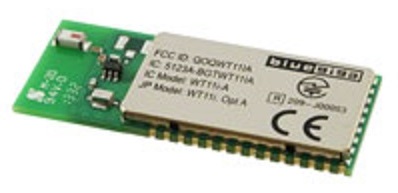I am developing a startup, and we are planning on using the SIMCOM SIM800F module for cellular communications on our device. If we use this module do we have to go through the FCC Certification process? Does the kind of antenna we use matter to the FCC (in-house PCB trace, or commercial rubber ducky)?
1 Answer
The only way I know to avoid the full FCC certification is to get a module that has an antenna already attached, whether an antenna connector, chip antenna or PCB trace. For example this Bluetooth module which I have used in the past comes with a chip antenna, in the upper left corner:
(I know you are using a GSM, but the same principal applies.) Note the FCC ID on the top of the module, this means the module has been pre-certified, because it has a chip antenna plus the relevant circuitry which allows the module to be tested as a whole. I have seen this even with modules that have an antenna connector, such as SMA or U.FL. Even with the pre-certification, you will have to go through some testing (to check, for example, that your microcontroller or other circuitry doesn't emit spurious emissions), but not as much.
The FCC doesn't care what kind of antenna you are using, as long as it passes the tests. I have never worked with a product that had a detachable antenna, but in that case, I imagine you would have to have something in your user instructions cautioning them not to attach an antenna with a gain more than such and such a limit.
Now in your case, the SIM800F module just has a pin that is to be connected to an antenna connector, or PCB or chip antenna. The datasheet for the SIM800F doesn't mention anything about FCC certification. So you will have to go through the more exhaustive testing.
One more note: if you have more than one radio in your device, such as cellular plus Bluetooth, or cellular plus BLE, etc. then all bets are off and you have to go through the full testing to make sure they play together nicely, whether the individual modules are pre-certified or not.
-
\$\begingroup\$ Do devices using pre-approved modules only need to undergo the tests for unintentional radiators? I've heard that unintentional radiators are things which emit RF energy without that being the express purpose of the circuit. This could be due to having some portion of the circuitry improperly shielded, having poor filtering on a trace that is long enough to act as an antenna, or something else that's creating unwanted RF noise. \$\endgroup\$ Commented Mar 29, 2016 at 6:12
-
\$\begingroup\$ @WKleinberg Unfortunately I'm not really clear on this point, because all of the modules I worked on had multiple radios (e.g. GSM and cell), which meant extra testing to make sure they didn't interfere with each other. But if I remember correctly (this was maybe five years ago) they spent most of their time on the GSM module (which fed into a PCB antenna) and not so much time with the per-certified WT11 Bluetooth. So it did make a difference. \$\endgroup\$– tcrosleyCommented Mar 29, 2016 at 6:37
-
\$\begingroup\$ Right. You mentioned that if multiple radio modules are incorporated, the full tests will be needed irrespective of the modules' certification status. However, isn't it the case that the modules' schematic diagrams, PCB designs, etc. will need to be provided in order to under the full tests and obtain certification? Most module makers don't release schematics - right? \$\endgroup\$ Commented Mar 29, 2016 at 15:14
-
\$\begingroup\$ @WKleinberg I'm not aware of any requirement to provide schematics or PCB layouts to the testing house. We were never asked to do this. \$\endgroup\$– tcrosleyCommented Mar 29, 2016 at 17:17

